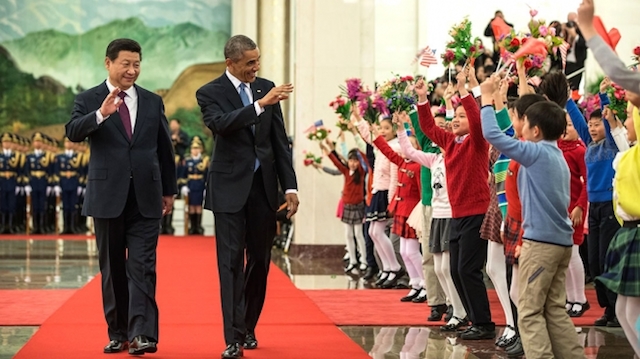Barack Obama and Xi Jinping in Beijing, November 12, 2014 image courtesy of The Whitehouse/Pete Souza
The US and China announced a major agreement to reduce carbon emissions. The US agreed to reduce emissions 26-28% from 2005 levels by 2025, while China pledged that its emissions would peak by 2030. Chinese President Xi Jinping also said that 20% of China’s energy production would be from clean energy sources by that date. At the end of October, the EU had said it would cut emissions 40% from 1990 levels by 2030. The US, China, and the EU account for around 60% of global emissions of greenhouse gases. The World Bank announced in November that emissions already have the world on a path to an average temperature increase of almost 1.5°C (2.7°F). In spite of cold temperatures in parts of the US, 2014 remains on pace to be the hottest year on record. Chris Mooney wrote that while the US and China’s promised emissions cuts are substantial, “if the agreement lays the groundwork for a broader global agreement—one that encompasses other major emitters like India, Japan, and Russia—then that is the real payoff.”
Ebola no longer appears to be spreading exponentially in Liberia. Health officials have seen less progress in Sierra Leone and Guinea, and the disease has begun to spread in Mali. The US National Institutes of Health (NIH) announced that a phase 1 clinical trial found that an experimental Ebola vaccine triggered the production of Ebola antibodies without causing any major adverse effects. The National Institute of Allergy and Infectious Diseases (NIAID), which is developing the vaccine in partnership with GlaxoSmithKline, said that it is in discussion with West African health officials about testing the vaccine in West Africa.
Iran and the P5+1 nations—the five permanent members of the UN Security Council plus Germany—agreed to extend nuclear talks through June 2015 after failing to reach a long-term agreement by their November 24 deadline. The extension keeps in effect the terms of last year’s interim agreement limiting the number of centrifuges Iran can use to enrich uranium and giving Iran partial relief from international sanctions. The P5+1 nations are negotiating to increase Iran’s “breakout time”—the amount of time Iran would need to produce a nuclear weapon—but talks appear to be hung up on how many centrifuges Iran should be allowed to operate in the long-term. The US has also said that Iran must provide better answers to International Atomic Energy Agency (IAEA) questions about how Iran’s nuclear facilities are being used. Iranian President Hassan Rouhani said that while there is still “some distance” between the two sides, negotiations “will lead to a deal, sooner or later”.
Russia informed the US that it would boycott the 2016 Nuclear Security Summit. In a diplomatic note, Russia reportedly cited the “changed political atmosphere”—an apparent reference to the conflict in Ukraine—and said the the Nuclear Security Summit was too political. The summits were started by the US in 2010 with the goal of keeping the material for building nuclear bombs out of the hands of terrorists. Gary Samore, a former adviser to President Obama, said that the summit had “become a victim of geopolitics”.
North Korea threatened to conduct a nuclear test in response to what it called “political provocation”. The statement came after a UN committee called on the Security Council to refer North Korea’s leaders to the International Criminal Court (ICC) for human rights violations. North Korea has conducted three nuclear tests since 2006. North Korea accused the US of buying “rubber stamps” to pass the resolution. The statement came just a day after reports that recent satellite imagery suggests that North Korea is preparing to restart the Radio-chemical Laboratory at Yongbyon, which produces weapons-grade plutonium. “The United States’ hostile acts are leaving us no longer able to refrain from conducting a new nuclear test,” North Korea’s statement said. “Our war deterrent will be strengthened infinitely in the face of the United States’ plot for armed interference and invasion.”
At the annual Convention on Conventional Weapons in Geneva, a number of states raised concerns about lethal autonomous weapons systems. Spain warned of the danger of an autonomous weapons arms race. Several countries said that international law should require lethal weapons to be under “meaningful human control”. Lockheed Martin is already developing an anti-ship missile that will maneuver for hundreds of miles on its own without human control. And Britain, Israel, and Norway are deploying weapons that rely on artificial intelligence (AI) to choose targets or decide when to fire. “An autonomous weapons arms race is already taking place,” AI researcher Steve Omohundro said. “They can respond faster, more efficiently and less predictably.”
This news summary was put together in collaboration with Anthropocene. Thanks to Tony Barrett, Seth Baum, Kaitlin Butler, and Grant Wilson for help compiling the news.
For last month’s news summary, please see GCR News Summary October 2014.
You can help us compile future news posts by putting any GCR news you see in the comment thread of this blog post, or send it via email to Grant Wilson (grant [at] gcrinstitute.org).








